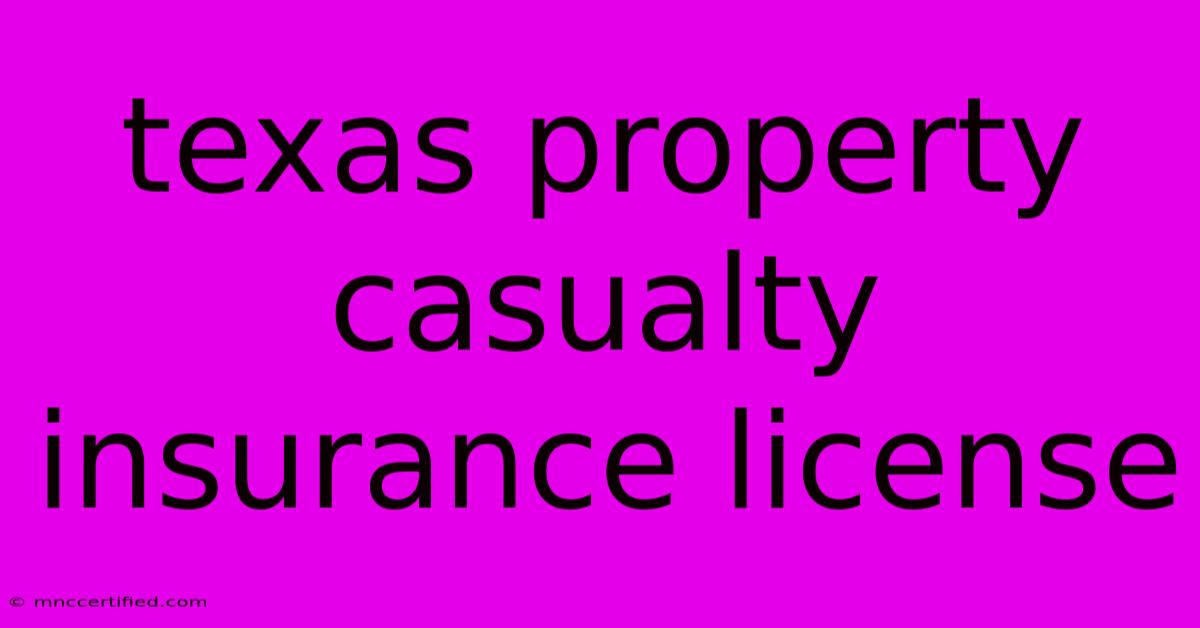Texas Property Casualty Insurance License

Table of Contents
Unlocking the World of Texas Property & Casualty Insurance: A Guide to Licensing
Are you passionate about helping individuals and businesses protect their valuable assets? Do you thrive in a fast-paced environment where you can make a real difference? Then a career in Texas property and casualty insurance might be the perfect fit for you. But before you can start selling policies and securing peace of mind, you need to obtain your license. This comprehensive guide will walk you through the steps and requirements to achieve your Texas property and casualty insurance license.
Understanding the Texas Property & Casualty Insurance Landscape
Texas is a major insurance hub, with a robust and diverse market for property and casualty insurance. This sector covers a wide range of risks, including:
- Homeowners insurance: Protecting homes against fire, theft, and natural disasters.
- Auto insurance: Covering vehicles against accidents, theft, and liability.
- Commercial property insurance: Safeguarding businesses from property damage and liability.
- Workers' compensation insurance: Providing financial support to employees injured on the job.
Who Needs a Texas Property & Casualty Insurance License?
To legally sell, solicit, or negotiate property and casualty insurance in Texas, you must possess a valid license. This applies to:
- Insurance agents: Individuals representing insurance companies and selling policies to clients.
- Insurance brokers: Individuals representing clients and finding the best insurance policies from various companies.
- Insurance adjusters: Individuals investigating and assessing insurance claims.
The Path to Obtaining Your Texas Property & Casualty Insurance License
The licensing process in Texas involves several key steps:
1. Eligibility Requirements:
- Age: Be at least 18 years old.
- Residency: Be a resident of Texas.
- Criminal Background: Pass a criminal background check.
- Financial Responsibility: Meet any required financial responsibility standards set by the Texas Department of Insurance (TDI).
2. Education and Training:
- Pre-licensing Education: Complete the required pre-licensing education courses offered by TDI-approved providers. These courses cover insurance principles, laws, and regulations specific to Texas.
- Exam Preparation: Thoroughly prepare for the licensing exam by studying the course materials, practicing with sample questions, and attending review sessions.
3. Licensing Exam:
- Proctoring: The exam is administered by a proctoring service. You can choose from various locations throughout Texas.
- Content: The exam tests your knowledge of insurance principles, Texas insurance laws, and industry practices.
- Passing Score: You must achieve a passing score to be eligible for licensure.
4. Application and Background Check:
- Application: Submit a completed application form to TDI, along with the required fees.
- Background Check: TDI will conduct a thorough background check to verify your eligibility.
5. License Issuance:
- Approval: If your application is approved, TDI will issue your license.
- Renewal: Your license must be renewed every two years.
Resources for Your Licensing Journey
- Texas Department of Insurance (TDI): The official source for all licensing information, including eligibility requirements, education courses, exam details, and application forms. Visit the TDI website at .
- Approved Education Providers: Find a list of TDI-approved education providers on the TDI website. These providers offer the pre-licensing courses required for your license.
- Professional Organizations: Consider joining professional organizations such as the Texas Association of Insurance Agents (TAIA) or the Independent Insurance Agents & Brokers of America (IIABA) for networking opportunities, continuing education, and industry updates.
Conclusion: A Rewarding Career in Texas Insurance
Obtaining your Texas property and casualty insurance license is an investment in a rewarding career. By understanding the licensing process, preparing diligently, and seeking the right resources, you can confidently pursue your path to becoming a successful insurance professional in Texas.
Note: This information is for general guidance only and should not be considered legal or financial advice. It is always recommended to consult with the Texas Department of Insurance or a licensed insurance professional for the most up-to-date information and personalized guidance.

Thank you for visiting our website wich cover about Texas Property Casualty Insurance License. We hope the information provided has been useful to you. Feel free to contact us if you have any questions or need further assistance. See you next time and dont miss to bookmark.
Featured Posts
-
Trump 2025 Inauguration Day Timeline
Nov 07, 2024
-
Fine Print Auto Insurance Declaration Page
Nov 07, 2024
-
Special Insurance Services Provider Portal
Nov 07, 2024
-
General Organisation For Social Insurance
Nov 07, 2024
-
Elon Musks Trump Support Boosts Dogecoin 8
Nov 07, 2024